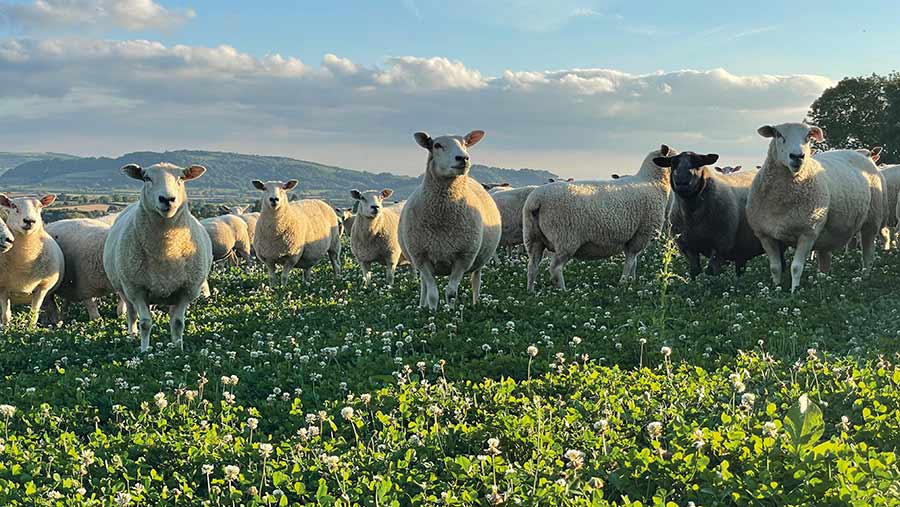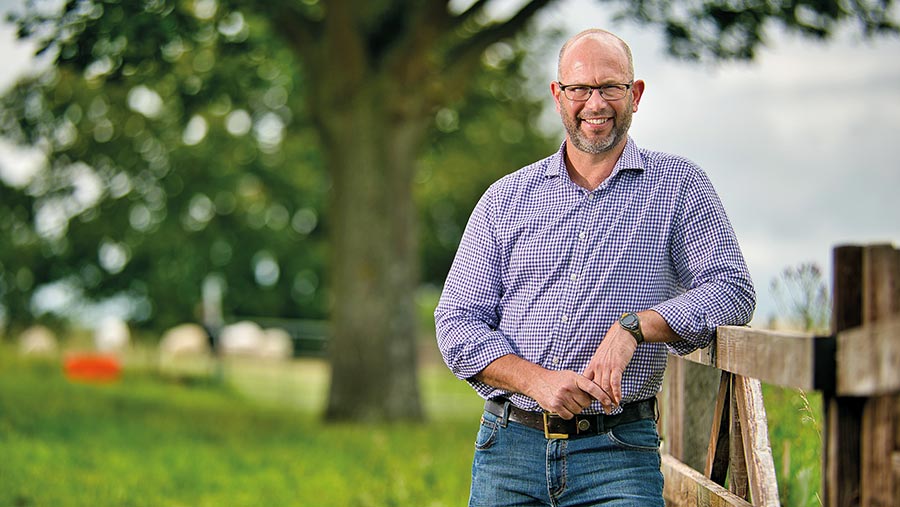High N prices raise profile of dwarf clover at Overbury Farms
 © Jake Freestone
© Jake Freestone With nitrogen fertiliser costing in the region of £1,000/t, Farmers Weekly 2021 Environmental Champion Jake Freestone is planning to increase his dwarf white clover understory acreage.
This living mulch cuts bought-in liquid fertiliser use, improves soil structure and suppresses weeds in wheat crops at Overbury Enterprisesin Gloucestershire.
The clover is grown in place of cover crops and will remain for the whole six-year rotation, so also reducing establishment costs overall.
Clover was initially grown on 27ha, about 10% of the wheat area, starting in 2021, when it was drilled in three fields where quinoa had failed after 25 days of frost in April 2021.
See also: Farmers Weekly Awards – 2021 Environmental Champion
Farm facts
- 1,600ha of in-hand land, of which 870ha combinable crops, remainder grass and stewardship, plus 250ha contract-farmed for neighbour
- Milling wheat, OSR, peas, beans, linseed, quinoa and malting barley
- 850 outdoor-lambing flock, small pedigree Dorset flock
- Higher Tier stewardship started January 2021
- Leaf demonstration farm since 2012 and an Agri-EPI satellite farm for hosting agri-tech research
“It’s not a one-crop wonder, as it’s quite expensive to establish,” says Jake. “The seed cost £7/kg last year and this year it’s gone up to £8.50/kg.”
The combine cutter bar is set at about 25cm, keeping it above the clover.
“Once you’ve combined, you have an instant high-protein cover crop for finishing lambs or conditioning ewes after weaning.”
It has been trial and error to determine which sheep the clover suits best. Romneys went on first last autumn, but got too fat on it.
However, it did a great job of improving the condition of North Country Mules ahead of tupping.
“We had a back run of hay available to the sheep so that they were introduced slowly to the clover, but once they got in the second field, they didn’t touch the hay,” says Jake.

Jake Freestone © Richard Stanton
KWS Champion feed wheat was drilled into the clover on 4 October, with a light dose of glyphosate before drilling, to check the clover and shock it into releasing a bit of N for the wheat.
The clover seed cost £68/ha (at 8kg/ha), and delivered 50kg of N at £3/kg on current fertiliser pricing.
A soil mineral N test on the clover fields on 20 January revealed 146kg of N in the soil, 30kg in the crops and 47kg of additional available nitrogen, to give a soil nitrogen supply (SNS) of 223kg/ha.
“It’s a question now of how much we give the crop and when – how much of the SNS will be in the soil profile. Some of it is 30-90cm down, so is not readily available, and the potential nitrogen available depends very much on the season.
So, if we assume half the SNS is available, we’ll apply another 50-60kg.
Because the clover is alive year round, it has a great potential beneficial effect on the soil structure.
Downsides, depending on the season, can include the risk that it will compete with the wheat for nutrients and moisture.
“We can shave back on fungicides for the wheat because of the improved soil health; it gets no insecticide anyway.
You have to watch molybdenum and cobalt levels, which are important for the emerging clover nodules,” says Jake.
Grazing wheat trial
He experimented with sheep grazing forward wheat crops for the first time this winter.
The farm’s own flock had plenty of grazing, so a neighbour’s sheep were hosted on a crop of Graham wheat at 60p a head a week.
This provided 600 grazing days/ha, with 314 head on 3.5ha of wheat.
“We got good regrowth and probably could have grazed it a bit more. We get better-rooting crops and the sheep eat off old and diseased material, which helps reduce disease potential and there’s a bit of nitrogen recycling through the sheep muck.”
Fertiliser strategy
Fertiliser strategy is under constant review, but the price hikes and supply issues of the past six months have put an additional focus on this.
Jake bought all of his 2022 requirements in last July and is now considering reducing the rate from 170kg/ha in order to carry over some stocks into the 2023 crop season.
Enter the 2022 Awards
The 2022 Environmental Champion of the Year is sponsored by the Woodland Trust.
Join Farmers Weekly in celebrating the farming industry and recognising the hard work of UK farmers and enter the awards today.
Alternatively, nominate a deserving individual for an award.
For more information about the 2022 Farmers Weekly Awards, visit the official Farmers Weekly Awards website.

